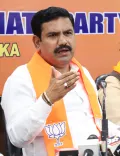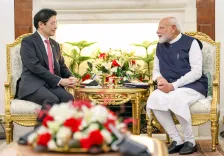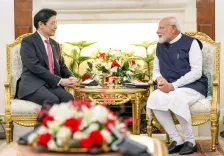Did the Centre Urge the SC to Handle Petitions Against the Online Gaming Act?

Synopsis
Key Takeaways
- The Online Gaming Act bans real-money games while regulating other types of gaming.
- The Centre seeks to centralize litigation to avoid confusion.
- Severe penalties are enforced for violations of the act.
- Major gaming platforms have halted money contests.
- The law aims to protect societal interests.
New Delhi, Sep 4 (NationPress) On Thursday, the Centre called upon the Supreme Court to take over petitions currently before various High Courts that challenge the constitutional validity of the Promotion and Regulation of Online Gaming Act, 2025.
The newly enacted Online Gaming Act prohibits all types of real-money gaming in the nation while regulating and promoting social, educational, and esports games.
In its petition for transfer, the Union government requested that the cases pending in the Delhi, Karnataka, and Madhya Pradesh High Courts be consolidated in the apex court to prevent duplication of legal processes.
The Chief Justice of India, B.R. Gavai, agreed to prioritize the listing of this matter after the Centre's counsel highlighted an upcoming interim order regarding the Online Gaming Act in the Karnataka High Court.
Earlier, the Madhya Pradesh High Court requested the Centre to address a plea that claims the Online Gaming Act violates fundamental rights by enforcing a blanket ban on “online money games”, including skill-based games recognized by the judiciary.
Just last week, the Karnataka High Court also called for the Centre's response to a petition from Head Digital, while a platform for online carrom recently challenged the law in the Delhi High Court.
During the Monsoon Session, Union Electronics and IT Minister Ashwini Vaishnaw introduced the Promotion and Regulation of Online Gaming Bill, 2025, which was successfully passed by both Houses of Parliament and subsequently received the President’s approval.
The Online Gaming Act mandates severe penalties for entities providing these services, including fines up to Rs 1 crore and up to three years of imprisonment. Moreover, promoting or advertising on such platforms can incur fines of Rs 50 lakh and a two-year prison sentence.
Following the government's decision, all online money gaming platforms, such as Dream11, Pokerbazi, and Rummy Circle, have ceased their money gaming contests.
Prime Minister Narendra Modi stated that the Bill aims to safeguard society from the detrimental effects of online money games after its passage in Parliament.
Remarkably, a day after the Lok Sabha approved the Bill in just seven minutes, the Rajya Sabha followed suit in a swift twenty-six minutes.








